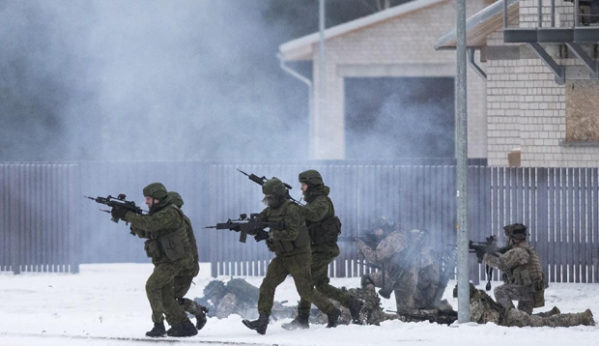
BERLIN – At one point during his campaign, President-elect Donald Trump asked, “What would be so bad about getting along with Russia?” Superficially, his words sounded like a call for reducing international tensions, Germany’s Left Party has no illusions. It knows that Trump will not push for any kind of progressive foreign policy when he takes office in January.
Left Party (Die Linke) activists are, in fact, planning massive anti-Trump demonstrations here in January to coincide with his inauguration in Washington, D.C.
“He actually seems to us to be a lunatic,” Oliver Schröder, the Left Party’s deputy chief for international politics, told People’s World in an interview last weekend. “Anyone saying the things Trump has said is dangerous, especially if he is going to be president of the United States, the dominant force on the planet.”
Schröder says he worries about an “uncertainty” factor in international politics.
“Trump creates uncertainty, and it is not good for the world when you don’t know what a big power will do tomorrow,” he said.

The Berlin membership of Schröder’s Left Party just approved, last week, an agreement that, for the first time ever, installed a “red-red-green” coalition government in this city, bringing the Left Party into a governing alliance with the Social Democratic Party and the Greens.
On foreign policy, said Schröder, the Left Party seeks an end to Germany’s “almost total” collaboration with the U.S. and NATO in world affairs. German Chancellor Angela Merkel has been a prominent voice pushing for NATO to be more assertive in Eastern Europe. In July, she urged a “visible and reliable” presence of the alliance’s military forces in countries bordering Russia.
Next year, Germany is set to take the helm of an armed detachment of 1,000 soldiers that will be stationed in Lithuania, a former Soviet republic. Merkel also plans to increase German defense spending to €39.2 billion ($41.4 billion), a boost of almost €5 billion from current levels.
Schröder said that instead of having NATO and Russia facing off against one another, he would like to see the American-led military alliance replaced by a cooperative “pan-European security structure” that includes Russia. “It is wrong that for the last 25 years NATO and the U.S. have tried to degrade Russia, treating it as a third-rate country,” he explained.
Opposing NATO’s buildup in the east does not equate to praise for Russia’s authoritarian leader, however. “We don’t characterize Russia under Putin as any kind of bastion of human rights, but we oppose the NATO encroachment right up to the borders of that country and the military maneuvers of NATO on former Soviet territory. These are provocative and dangerous.”
On the Middle East, Schröder said, “As leftists, we oppose all war and killing. We know that DAESH (also known in the West as ISIS/ISIL) is dangerous and has to be opposed, but we are against the destabilizing and tearing apart of countries long carried out by Western countries. We oppose the U.S. policy of trying to play off one country in the region against the other, and we oppose German involvement in this.”
Schröder then spoke about Russia’s recent aggression on the world stage. Its military backing for the embattled Assad government in Syria, including the bombing from air and sea, has come under particular scrutiny. But Schröder said that Russian involvement in the region is only one part of the story.
“The bombings and killing in Syria where Russia is involved are terrible, but so are the efforts to tear apart that country which are supported by the U.S. and so is the bombing and killing in Mosul in Iraq which the U.S. is supporting. Both the U.S. and Russia have black marks on their hands. But the basic fact is that the U.S. cannot be dismembering countries in the Middle East. It leads to disaster.”
Schröder said the Left Party is unequivocally opposed to German troops participating in any of these efforts. “We are on the side of world peace,” he said, “which means we oppose all aggression.”
He said that reform of the United Nations is also a necessary component in efforts to stabilize the world.
“I would like to see new countries like Brazil, India, and China come onto the Security Council of the UN,” he said.
On the decision of the voters in the UK to leave the European Union – the so-called Brexit – Schröder said, “Our position is that this is a decision for the British people. The basic premise of the EU is what the big problem is here – the premise that you install free market neoliberal capitalism and then everything else – freedom and democracy and prosperity – will follow. It doesn’t work that way. We need a cooperative economic structure that respects sovereignty, social structure, and the living standards of people in the member countries.”










